人教版高中英语必修4 Unit3 A tast of Englishi humor 全单元课件(共86张ppt)
文档属性
| 名称 | 人教版高中英语必修4 Unit3 A tast of Englishi humor 全单元课件(共86张ppt) |  | |
| 格式 | zip | ||
| 文件大小 | 2.8MB | ||
| 资源类型 | 教案 | ||
| 版本资源 | 人教版(新课程标准) | ||
| 科目 | 英语 | ||
| 更新时间 | 2020-04-18 18:36:00 | ||
图片预览

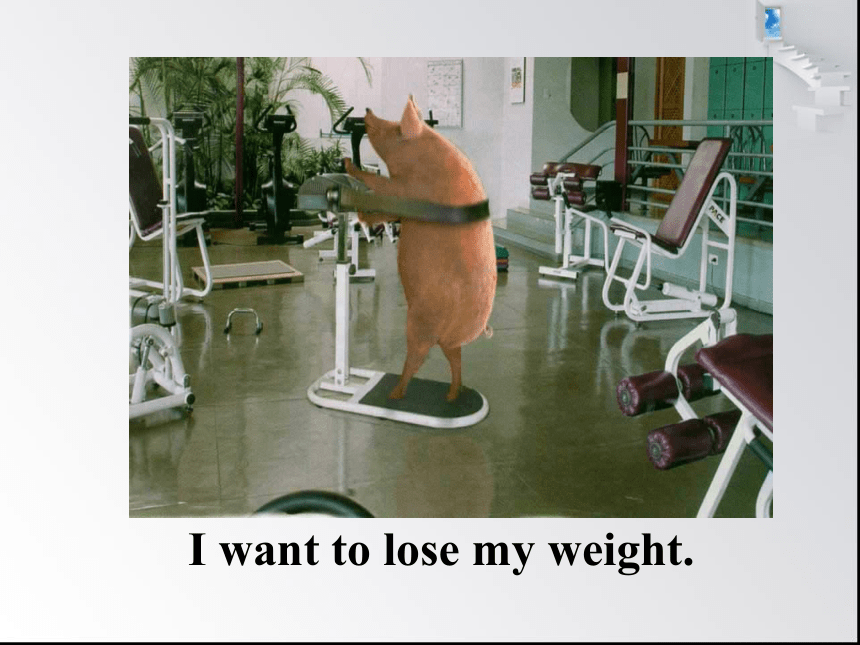

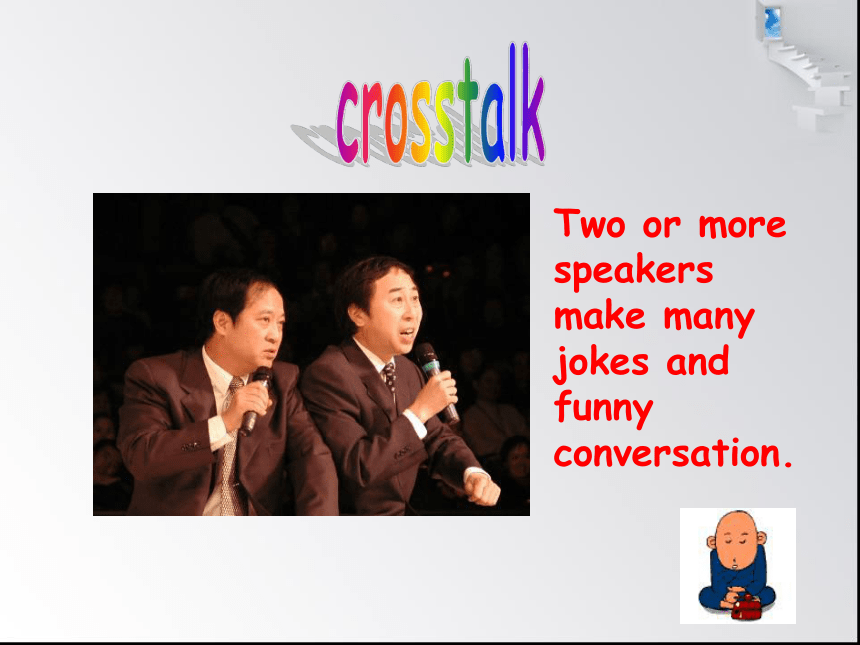

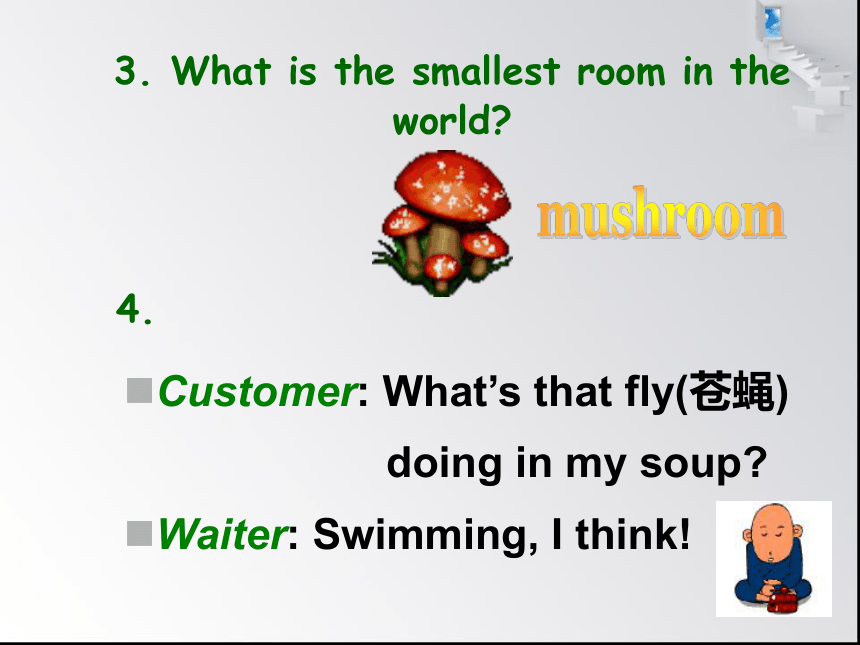

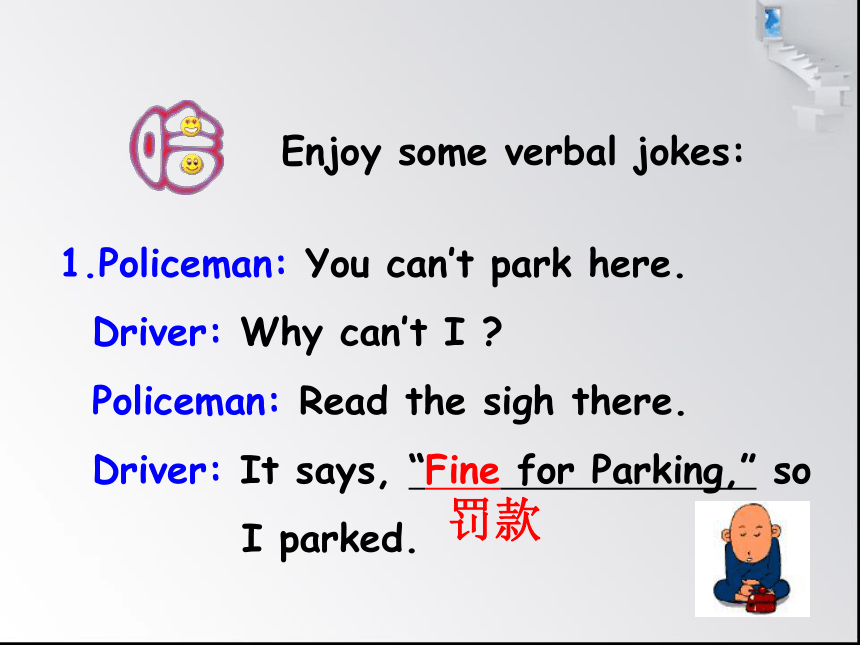
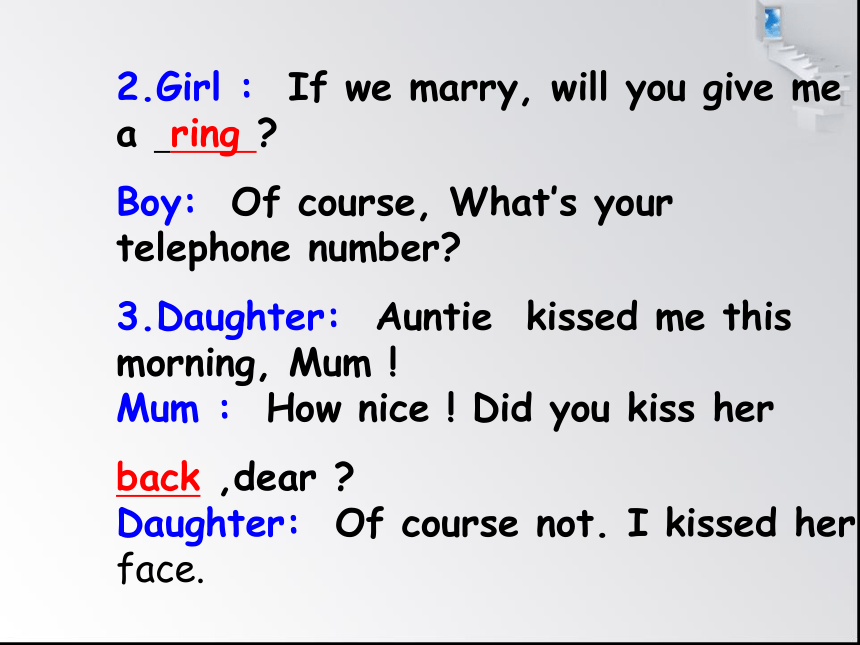
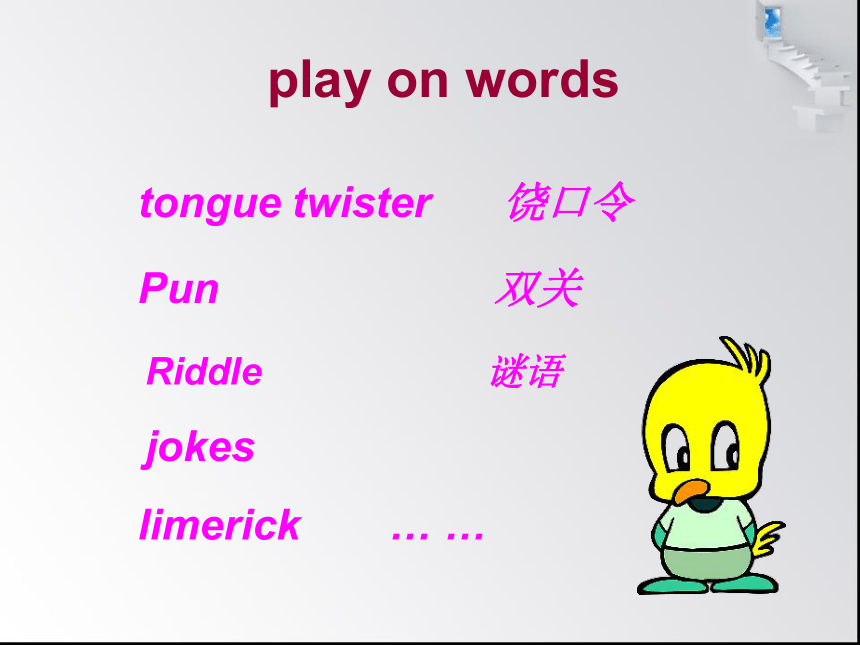
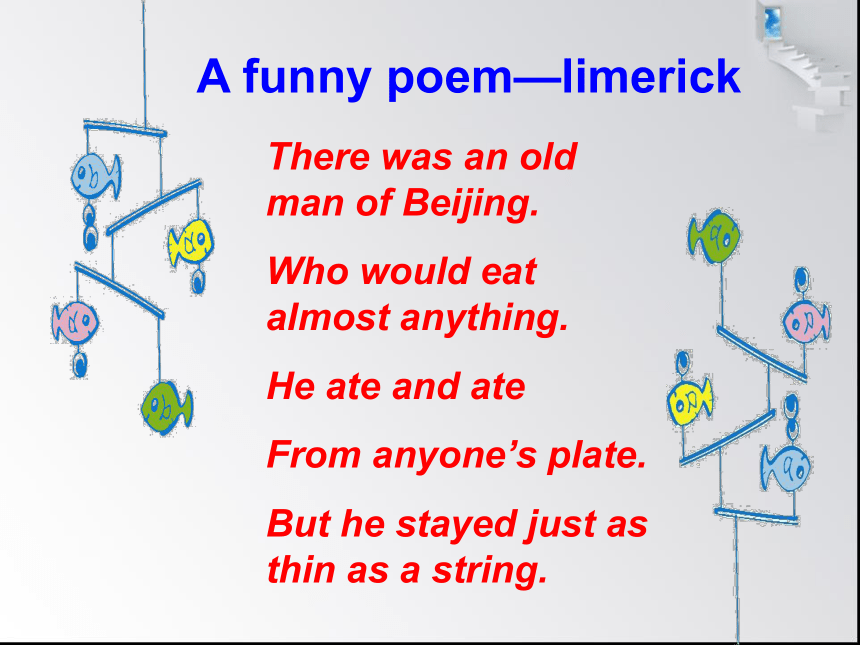
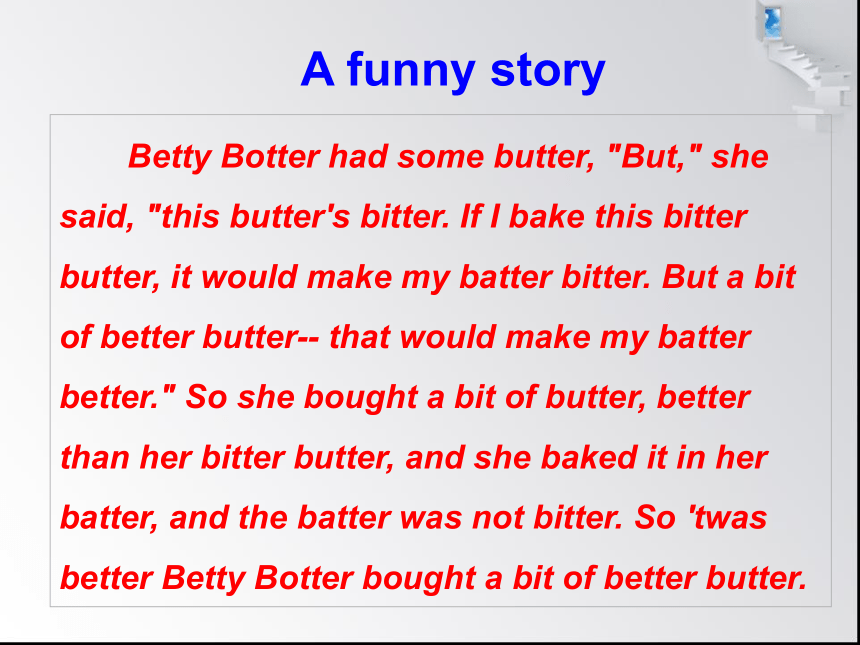
文档简介
(共86张PPT)
Lead-in
Look at the following pictures.
Which picture can make you laugh?
Do you feel my love?
I want to lose my weight.
Chinese humorists
Who are they?
crosstalk
Two or more speakers make many jokes and funny conversation.
joke
1. What day of the week is the best for having fried foods?
Friday
三月;行军
March
2. What month do soldiers hate?
3. What is the smallest room in the world?
Customer: What’s that fly(苍蝇)
doing in my soup?
Waiter: Swimming, I think!
4.
mushroom
A tongue twister competition
1.She sells seashells on the seashore. And the shells she sells are seashells, I am sure. 'cause if she sells shell at the seashore, the shells she sells are seashells, for sure.
2.A big black bug bit the back of a big black bear. The big black bear bit back the big black bug.
3.Robert Rolly rolled a round roll round. If Robert Rolly rolled a round roll round, where is the round roll, Robert Rolly rolled around?
1.Policeman: You can’t park here.
Driver: Why can’t I ?
Policeman: Read the sigh there.
Driver: It says, “Fine for Parking,” so
I parked.
Enjoy some verbal jokes:
罚款
2.Girl : If we marry, will you give me a ring ?
Boy: Of course, What’s your telephone number?
3.Daughter: Auntie kissed me this morning, Mum !
Mum : How nice ! Did you kiss her
back ,dear ?
Daughter: Of course not. I kissed her face.
play on words
tongue twister 饶口令
jokes
Pun 双关
Riddle 谜语
… …
limerick
A funny poem—limerick
There was an old man of Beijing.
Who would eat almost anything.
He ate and ate
From anyone’s plate.
But he stayed just as thin as a string.
Betty Botter had some butter, "But," she said, "this butter's bitter. If I bake this bitter butter, it would make my batter bitter. But a bit of better butter-- that would make my batter better." So she bought a bit of butter, better than her bitter butter, and she baked it in her batter, and the batter was not bitter. So 'twas better Betty Botter bought a bit of better butter.
A funny story
Let’s enjoy Mr. Bean’s humour
Click to it!
Unit 3
A Taste of English Humour
Knowledge Goals
Topic
Different types of English humour.
Words and Expressions
Learning Goals
Words:
humour, comedy, content, performer, astonish, astonishing, fortunate, fortunately, ordinary, bored, entertain, throughout, homeless, moustache, failure, overcome, leather, chew, convince, convincing, direct, outstanding, Switzerland, gesture, particular, particularly
Expressions:
fall down, be cruel to, at times, be content with, be unkind to sb, thousands of, pick up, caught on, cut off, pick out, be buried in, knock into, turn into.
Functional Items
Grammar
How to express your emotions?
Learn to use these sentence types:
How wonderful!
It surprises me that…and so on.
Learn the –ing form as the predicative, attribute and object complement.
Ability Goals
Emotion Goals
Enable the students to talk about some types of English humor and Chinese humor, then learn what humor means and what is nonverbal humor.
Let the students listen and read the jokes, so that they can realize that humor is to let people be optimistic about everything around.
Help students learn how to describe what nonverbal humor is by Charlie Chaplin’s career.
Important and Difficult Points
Important Points
Help the students learn how to understand and enjoy English humor. While as to the reading, learn how to divide the text into several parts according to the meaning of the passage.
Difficult Points
To grasp the basic word formation and then summarize by themselves.
The correct understanding of the meaning of the passage then write a similar composition.
Warming up
Charlie Chaplin
a small black hat
a moustache
a stick
very wide trousers
He wore a small black hat, very wide trousers, a moustache and carried a stick that he swung in the air as he walked.
Give a description on Chaplin?
Charlie Chaplin
Was born in
His job is
In 1972, he was given
Type of acting is
His charming character is
His costume:
Reasons of success:
He died in
in
1889
an actor
mime and farce.
The Little Tramp
large trousers,
worn-out shoes
and small round
black hat.
a special Oscar for
his outstanding
work.
He could
astonish and
inspire us
skillfully.
1977
Switzerland.
I’m driving at a high speed.
(funny stories)
Mark Twain was the popular and humorous American author.
adj.幽默的
(mime)
Mr. Bean is funny because he makes funny faces and acts silly behaviour.
笑剧,滑稽剧
Do you feel funny?
How many kinds of humour do you know about?
funny poems
cross talk 相声
Kinds of humor
funny stories
comedy
mime 哑剧
sketch小品
jokes
Chinese humors
Pantomime
Funny plays
Cross talk
Jokes
Doggerel
English humors
Nonverbal
Mime and farce
Verbal jokes
Funny stories
Funny poems
varieties of humors
Pre-reading
1.Can you give some examples of humorous film stars?
2.How many Charlie Chaplin’s films have you seen?
3.Do you feel his film is really interesting?
Reading
1. Fast Reading, pay attention:
What is the main idea of the passage?
How much do you know about Charlie?
2. Listen to the text:
3. Detailed reading:
True or False
(1) Charlie Chaplin was poor when he was
a small boy.
(2) People who don’t know English cannot
enjoy Chaplin’s films.
(3)The Gold Rush is set in California in the
late of the nineteenth century.
(4) In The Gold Rush Chaplin and his friend are fortunate to find some gold .
(5) In the film the meal he eats is hard to
chew.
(6) Chaplin not only acted in films but wrote and directed films as well.
T
F
F
F
T
T
The writer mentioned that Chaplin's character “little tramp” is charming and lovable, and he won an Oscar for a lifetime of outstanding work, which proves that the writer likes Chaplin and appreciates his work.
What’s the author’s attitude to Charlie
Chaplin?
A. positive B. negative
C. serious D. appreciative
4. Read the text a third time:
While reading make a list of the useful phrases you’ve noticed in the passage, and get familiar with their usage.
Language Points
1. Do you find it funny to see someone sliding on a banana skin, bumping into someone else round a corner, or falling down a hole in the road?
你看到有人被香蕉皮滑倒,或看到有人在拐角处撞倒另外一个人, 或有人掉进路 边一个洞里时, 你会觉得滑稽可笑吗?
find it… to do 发现做(某事)很……如:
他发现向父母解释自己的困境是很难的。
He found it hard to explain his difficulties to his parents.
她发现学好英语是很重要的。
She found it very important to learn English well.
能用于这种形式宾语结构的动词还有:feel, think, make 等等。
He makes it a rule to check his homework carefully.
I don’t think it possible to do it.
宾语补足语可以是:名词; 形容词;不带to的不定式;过去分词;介词短语;现在分词。如:
Make yourself comfortable.
He made them work hard.
I made myself understood.
I made him outside the room.
She made his son studying all day.
A lot of exercise made him a strong boy.
形容词
省to不定式
过去分词
介词短语
现在分词
名词
这种句型的结构为:动词+宾语+宾语补足语。
可以加宾语补足语的动词有:
感官动词:see, watch, notice, find, observe, catch, hear, feel;
使役动词:get, have, make, let, keep leave, send.
我听到鸟儿在唱歌。
对不起, 让你久等了。
I heard birds singing.
I am sorry to have kept you waiting so long.
bump into 撞上;巧遇;邂逅 如:
The two cars bumped into each other.
这两辆车撞到了一起。
Lucia was shopping when she suddenly bumped into her old friend Debra.
露西亚购物时碰上了老朋友黛布拉。
2. Some humour can be cruel but some people seem to enjoy seeing other people’s bad luck at times.
有些幽默可能是残酷无情的,但一些人有时似乎很喜欢看到别人倒霉。
cruel adj. cruelty n.残忍
be cruel to 对 …… 残酷
do harm to=be harmful for 对……有害。如:
He hates the person who is cruel to
animals. 他憎恨虐待动物的人。
I am much better now. Only a little cough at times.
我现在好多了,只是有时还有些咳嗽。
I found her difficult to understand at times.
我发现有时候很难理解她。
at times 有时候 如:
At the time, I felt that I wanted to leave the company.
那时,我真想离开那家公司。
He is late for meetings at no time.
他开会从不迟到。
She fought back in no time that the speed of her was like lightening.
她回击极快,速度像闪电。
拓展:与time 有关的短语
at a time 每次,一次
at one time 同时,曾经有一段时间
at the time 在那时
at no time 从不
in no time 立即,马上
Please pass me two books at a time.
把书递给我,每次两本。
At one time, we met frequently.
有一段时间我们常见面。
3. He made people laugh at time when they felt depressed, so they could feel more content with their lives.
人们沮丧的时候,他能时不时地让人们发笑,所以人们就会更满足自己的生活。
(1)content (adj.): satisfied, happy, not wanting more 满足,满意,知足。常见搭配:
be content with sth.
be content to do sth.
be content that… 如:
Are you content with your present salary?
你对你现在的工资待遇满意吗?
She is quite content to stay at home looking after her children.
她呆在家里照顾孩子感到非常知足。
区别: content; contented; satisfied
content与contented意思接近,指“虽然各种愿望没有实现,但人应安于现状不再多求”,content 一般作表语,而contented一般作定语; satisfied指“愿望、渴望或需求都得到了满足, 因而心满意足了”。如:
She has a contented look.
她显得满意的样子。
(2)content (vt.)使满意, 使满足
content sb./oneself with sth. 使……满足于……
I content myself with a glass of coffee every day.
(3) content (n.): that which is contained in sth. 所含之物,内容
I like the style of the book but I don’t like the content.
我喜欢这本书的文体,但我不喜欢它的内容。
4. However, some actors can astonish us with the deep feelings they can inspire in us for a character they are playing.
不管怎样,有些演员能用他们所演的角色在我们身上鼓动起来的深深情感震撼我们。
(1) astonish: to surprise sb. greatly 使(某人)吃惊, 震惊。比surprise的语气要强。 如:
The earthquake astonished me.
地震使我惊慌失措。
be astonished by/at sth. / to do sth/ that从句,如:
She was astonished to find he was drunk.
发现他喝醉了, 她很吃惊。
He was much astonished that you had failed.
你居然失败,他大感惊讶。
I was astonished at/by the news.
这消息使我大吃一惊。
astonishing adj. 令人吃惊的
an astonishing remark 惊人之语
astonishment n. 惊异;惊愕;惊奇
in astonishment 愕然, 吃惊地 如:
She stared at me in astonishment.
她吃惊地瞪着我。
to one’s astonishment 令……惊异的是…… 如:
To our astonishment the small boy swam across the river.
令我们惊奇的是那小男孩居然游过了那条河。
(2) inspire 的用法:
a. inspire sb. (with sth.) / inspire sth. (in sb.) 激起某人某种情感。如:
His speech inspired them with hope.
他的演讲燃起了他们的希望。
This inspired in us a love for learning.
这激起了我们对学习的热爱。
b. inspire sb. to do sth. : 激励某人做某事 如:
We are inspired to work harder by his example.
他的榜样激发我们更加努力工作。
inspiration n.灵感; 好主意
inspired adj. 得到灵感的; 得到启示的
inspiring adj. 鼓舞的; 激励的
(3)character的用法:
a. a person in a novel, play, film etc.
人物。 如:
What’s the name of the major character in this novel?
这部小说的主人公叫什么名字?
b. the quality that makes sb./ sth. different from other people/things; the nature of sb./ sth. (个人、集体、民族等特有的)品质;特性。如:
Although they are twins, their characters are quite different.
虽然他们是双胞胎,但性格却相差甚远。
She is a woman of good character.
她是个性格很好的女人。
5. His charming character The Little Tramp is well known throughout the world.
他所塑造的“小流浪汉”的可爱角色依旧闻名于世。
throughout prep.
(1)(表示地区)遍及, 整个 如:
The company has branches throughout the country.
这家公司的分公司遍及全国。
(2)(表示时间)整个,从头到尾 如:
It rained throughout the day.
雨下了一整天。
He led a poor life throughout his life.
他一生过着穷苦的生活。
throughout adv.
(1) 整个地,在所有各处,全部 如:
The hill was green throughout.
那座山整个都是绿的。
(2) 自始至终,到最后 如:
She remained silent throughout.
她从头到尾都保持沉默。
6. Unfortunately his father died, leaving the family even worse off, so Charlie spent his childhood looking after his sick mother and his brother.
不幸的是,他父亲死后让这个家的生活更困难,于是查理的童年是在照顾生病的母亲和哥哥中度过的。
worse off 穷的,缺少的;境况更差。如:
We shouldn’t complain about being poor ,many families are much worse off.
我们不应该因为穷而叫苦连天,许多人的家境更糟。
原形: badly off : in a poor position, esp. financially 潦倒;穷困
反义词:well off
他们贫困得根本谈不上度假。
They are too badly off to have a holiday.
Learning about Language
1. Words
astonish astonishing fortunate fortunately ordinary bored entertain throughout homeless moustache failure overcome leather chew convince convincing
direct outstanding Switzerland gesture particular particularly occasion pancake
budget actress slide amuse explanation detective
2. Expressions
be worse off be content with
In search of sth pick out
cut off star in
bump into sth up to now
be cruel to at times
cruel, particular, slide, entertaining, overcome, failure, difficulty,
direct, fortunate, swing, whisper,
1.Mr. Smith had some _________in understanding the man who had a Scottish accent.
2.I am just back from a tiring journey and have nothing ________ to do this evening.
3.The children were _____ on a rope hanging from a tree.
4.I can't understand why some people are ________to animals. They even kill them for food.
5.He ________his fear of heights and followed the others to the top of the mountain.
Complete the following sentences with the proper form of the given words.
difficulty
swinging
cruel
overcame
particular
6.Black Horse is a (n) _______ book for children. They find it very amusing and interesting.
7.Xie Jim was a famous director when lie was young. He _________a lot of films.
8.You are _________enough to have had the help and guidance from such an experi?enced teacher.
9.I did not dare to speak aloud or even ______ to Alice in such a quiet reading room.
directed
fortunate
whisper
entertaining
3.Structures
——The –ing form as the predicative,
attribute and object complement
一、-ing形式作定语
动词的-ing形式作定语,所涉及的其实也就是动名词作定语及现在分词作定语的问题,它们在形式上一样,语法功能也很相近,但就其各自不同的表达意义则又有一定的区别。
1. 单个动词的-ing形式作定语位于被修饰名词的前面,可以表示被修饰者的用途和性能,这时它通常为动名词。如:
a working method?=a method of working? 工作方法
2.单个动词的-ing形式作定语位于被修饰名词的前面,也可以表示被修饰者的动作或状态,这时它是现在分词。如:
developing countries = countries that are developing
发展中国家
an ordinary-looking house = a house that looks ordinary
看起来很普通的房子
3. -ing形式短语作定语时, 放在所修饰的名词之后, 并且在意思上相当于一个定语从句,这时这个-ing形式的短语肯定是现在分词短语。如:
They lived in a house facing south.
= They lived in a house which is facing south.
他们住在一所朝南的房子里。
Anybody swimming in this river will be fined.
= Anybody who is swimming in this river will be fined.
在这条河里游泳的任何一个人都会被罚款。
4. -ing形式短语作为现在分词短语也可以用作非限制定语,相当于一个非限制性定语从句,这时它与句子其他部分用逗号分开。如:
The old man, sitting in the bench, is reading book.
= The old man, who was sitting in the bench, is reading book.
老人坐在长凳上,正在看书。
注意:在以下两种情况下,动词-ing形式不能用来作定语,必须用定语从句。
① 作定语的动词-ing形式表示的动作要与主句谓语的动作同时发生,如两者不能同时发生的话,则需使用定语从句。
② 动词-ing形式的完成式一般只用来作状语,不作定语。
二、-ing形式作表语
1. -ing形式作表语时放在系动词之后表示主语的性质、状态、功能及用途等。需要注意的是,这种-ing形式绝大多数情况下都为现在分词或分词短语,但在某些情况下则属于动名词,其区别在于前者更强调性质与状态,其形容词的特征十分明显;后者注重于功能与用途,其名词的特征十分明显,这时它基本上就是一个名词。如:
Her job is keeping the lecture hall as clean as possible.
她的工作是尽量使报告厅保持干净。(现在分词短语)
My major is swimming.我主修游泳。(动名词)
2.用来表示主语的身份或特征。如:
The news is quite exiting.
这条新闻很振奋人心。
三、-ing形式作宾语补足语
1. 动词的-ing形式作为现在分词或短语,在句中用作宾语补足语。
(1) 动词-ing形式作宾语补足语常放在宾语后面,表示一个正在进行的主动性的动作,强调一个过程或一种状态。如:
I saw him going upstairs.
我看见他正在上楼。
(2)当主句转换为被动结构时, 原来作宾语补足语的动词-ing形式便转换为主语补足语。如:
We heard her singing in her room. = She was heard singing in her room.
我们听到她在房间里唱歌。
2. 能用-ing形式作宾语补足语的几类动词:
(1) 在see, hear, feel, smell, find, notice, observe, look at, listen to等表示感觉和心理状态的动词后面,和一个名词或代词一起构成复合宾语。如:
We heard the children shouting upstairs.
我们听见孩子们在楼上叫喊。
I felt my heart beating violently.
我觉得我的心在猛烈地跳动。
(2)使役动词have, set, keep, get, catch, leave等后面通常可以用这种形式用作宾语补足语。如:
They should not leave us wondering what they will do next.
他们不应该不让我们知道他们下一步要做什么。
We kept the fire burning all night long.
我们让火整夜燃烧着。
3. see, hear, feel, watch等动词之后用-ing形式和动词不定式作宾语补足语的区别:
①用动词-ing形式时,表示动作正在进行;用不定式时,表示动作发生了,即动作的全过程结束了。如:
He saw a girl getting on the bus.
他看见一个女孩在上公共汽车。
He saw a girl get on the bus.
他看见一个女孩上了一辆公共汽车。
②如果宾语补足语是一系列的动作,通常只能用不定式来表示,不用动词-ing形式。如:
I saw him enter the room, sit down and light a cigarette.
我看见他走进房间,坐了下来,点燃了一根香烟。
1.Though I have often heard this song ______, I have never heard you ______ it.
A. being sung; sang B. sang; singing
C. sung; sing D. to be sung; to sing
答案C。hear sb. / sth.后可跟动词原形、-ing形式及动词过去分词作补语。一般来讲,跟动词原形表示一个完成的动作;跟-ing形式表示一个正在进行的动作;跟动词过去分词表示被动。
Exercise
2. It was so cold that they kept the fire ______ all night.
A. to burn B. burn
C. burning D. burned
答案C。keep sth. doing 表示“使……持续某种状态”。
3. He looked around and caught a man ______ his hand into the pocket of a passenger.
A. put B. to be putting
C. to put D. putting
答案D。本题中catch意为“碰上”、“撞见”,catch sb. doing sth.表示“撞见某人正在做某事”,用-ing形式作宾语补足语。
4. —Did you meet anyone ______ at the party?
—No, in fact, I found the party rather ______.
A. interesting; boring B. interested; boring
C. interesting; bored D. interested; bored
答案A。第1空,interesting作定语,修饰anyone;第2空, boring作宾语补足语。
Using Language
1. Which is best title for this story?
2. Why was Mary Smith frustrated?
3. What turned the jam into wine?
4. Did you find this story funny? Why?
5. What do you think of John’s behavior?
Part 1
Part 2
Speaking
Discuss in groups. What kind of people are Sherlock Holmes and Doctor Watson?
Discuss in groups of three. Change the funny story into a short play. Be prepared to act it out.
Reading and Writing
Choose one topic and do your writing.
(1) The play Sherlock Holmes and Doctor Watson
( 2) Do you think the jokes/story/play you have read/watched funny? Give your reasons.
Summing up
重点单词:
verbal, nonverbal, mime, farce, slide, skin, cruel, particular, entertaining, throughout, homeless, worn-out, failure, overcome, difficulty, fortunate, snowstorm, chew, outstanding, Switzerland
重点短语:
content with, badly off, pick out, cut off, star in
语法:
话题:
功能:
Different types of English humour
情感(Emotions)
动词的-ing形式作表语、定语和宾语补足语
一、单词拼写 根据所给的词性和词义写出下列单词。
1.______________n. 皮肤;外壳
2.______________ adj.残酷的;令人痛苦的
3.______________ n.& adj. 底部;底部的
4.______________ vt. 使惊讶
5.______________ n. 一口;满口
6.______________ vt. 使欢乐;款待
7.______________ adv. 特别地
8.______________ adj. 无家可归的
skin
cruel
bottom
astonish
mouthful
entertain
particularly
homeless
Exercises
二、单词运用 根据句子的结构和意思,在空格处填入一个恰当的单词或者用括号中所给词的适当形式填空。
1.Today the Chinese teacher began the class with an amusing ____________ show .
2.I kept a diary at times when there was something _____________ to keep down.
3.The class were cheered up by her _____________ performance.
4.We like to stay with him, for he’s a man with a pretty ___________ of humour.
5.The woman sat there, __________ (chew) a piece of gum.
slide
particular
outstanding
sense
chewing
6.He will never forget that ___________ experience of his.
7.She ___________it to me so as not to be heard by others.
8.It will do you good to have plenty of ____________ (boil) water every day.
9.We really had pity on the poor ____________ girl and took her to our house.
10.Cold-blooded animal will sleep ___________ the winter without eating anything.
throughout
cruel
whispered
boiled
homeless
三、词语派生 用括号中所给词的适当形式填 空。
1. As a result of their impatience , that plan ended in _____________ (fail).
2._____________ (fortune), we two were selected for the Olympic torture bearers in Guangdong.
3.Besides the point, the accident happened for some other _____________ (direct) reasons.
4.You are expected to spend an _____________ (entertain) evening in this place of public _______________ (entertain).
5.The government is trying to stop the strike in a ______________ (violent) way.
failure
fortunately
indirect
entertainment
entertaining
non-violent
1.对……满足(意) ______________________
2.在整个亚洲 _________________________
3.战胜困难 ___________________________
4.挑出;辩别出 ___________________________
5.一条丧家狗 ____________________________
6.撞上;撞见_____________________________
7.突出的成就____________________________
8.幽默感 ______________________________
sense of humour
be content with
throughout Asia
overcome difficulties
pick out
a homeless dog
knock into
outstanding achievements
四、词组翻译
9.badly off ___________________________
10.in particular_________________________
11.cut off _____________________________
12.star in _____________________________
13.in search of _________________________
14.be born in poverty____________________
15.be set in ____________________________
16.go camping__________________________
穷的; 缺少的
特别; 尤其是
切断; 断绝
主演
寻找; 寻求
出身贫寒
以……为背景
野营
bye bye
Lead-in
Look at the following pictures.
Which picture can make you laugh?
Do you feel my love?
I want to lose my weight.
Chinese humorists
Who are they?
crosstalk
Two or more speakers make many jokes and funny conversation.
joke
1. What day of the week is the best for having fried foods?
Friday
三月;行军
March
2. What month do soldiers hate?
3. What is the smallest room in the world?
Customer: What’s that fly(苍蝇)
doing in my soup?
Waiter: Swimming, I think!
4.
mushroom
A tongue twister competition
1.She sells seashells on the seashore. And the shells she sells are seashells, I am sure. 'cause if she sells shell at the seashore, the shells she sells are seashells, for sure.
2.A big black bug bit the back of a big black bear. The big black bear bit back the big black bug.
3.Robert Rolly rolled a round roll round. If Robert Rolly rolled a round roll round, where is the round roll, Robert Rolly rolled around?
1.Policeman: You can’t park here.
Driver: Why can’t I ?
Policeman: Read the sigh there.
Driver: It says, “Fine for Parking,” so
I parked.
Enjoy some verbal jokes:
罚款
2.Girl : If we marry, will you give me a ring ?
Boy: Of course, What’s your telephone number?
3.Daughter: Auntie kissed me this morning, Mum !
Mum : How nice ! Did you kiss her
back ,dear ?
Daughter: Of course not. I kissed her face.
play on words
tongue twister 饶口令
jokes
Pun 双关
Riddle 谜语
… …
limerick
A funny poem—limerick
There was an old man of Beijing.
Who would eat almost anything.
He ate and ate
From anyone’s plate.
But he stayed just as thin as a string.
Betty Botter had some butter, "But," she said, "this butter's bitter. If I bake this bitter butter, it would make my batter bitter. But a bit of better butter-- that would make my batter better." So she bought a bit of butter, better than her bitter butter, and she baked it in her batter, and the batter was not bitter. So 'twas better Betty Botter bought a bit of better butter.
A funny story
Let’s enjoy Mr. Bean’s humour
Click to it!
Unit 3
A Taste of English Humour
Knowledge Goals
Topic
Different types of English humour.
Words and Expressions
Learning Goals
Words:
humour, comedy, content, performer, astonish, astonishing, fortunate, fortunately, ordinary, bored, entertain, throughout, homeless, moustache, failure, overcome, leather, chew, convince, convincing, direct, outstanding, Switzerland, gesture, particular, particularly
Expressions:
fall down, be cruel to, at times, be content with, be unkind to sb, thousands of, pick up, caught on, cut off, pick out, be buried in, knock into, turn into.
Functional Items
Grammar
How to express your emotions?
Learn to use these sentence types:
How wonderful!
It surprises me that…and so on.
Learn the –ing form as the predicative, attribute and object complement.
Ability Goals
Emotion Goals
Enable the students to talk about some types of English humor and Chinese humor, then learn what humor means and what is nonverbal humor.
Let the students listen and read the jokes, so that they can realize that humor is to let people be optimistic about everything around.
Help students learn how to describe what nonverbal humor is by Charlie Chaplin’s career.
Important and Difficult Points
Important Points
Help the students learn how to understand and enjoy English humor. While as to the reading, learn how to divide the text into several parts according to the meaning of the passage.
Difficult Points
To grasp the basic word formation and then summarize by themselves.
The correct understanding of the meaning of the passage then write a similar composition.
Warming up
Charlie Chaplin
a small black hat
a moustache
a stick
very wide trousers
He wore a small black hat, very wide trousers, a moustache and carried a stick that he swung in the air as he walked.
Give a description on Chaplin?
Charlie Chaplin
Was born in
His job is
In 1972, he was given
Type of acting is
His charming character is
His costume:
Reasons of success:
He died in
in
1889
an actor
mime and farce.
The Little Tramp
large trousers,
worn-out shoes
and small round
black hat.
a special Oscar for
his outstanding
work.
He could
astonish and
inspire us
skillfully.
1977
Switzerland.
I’m driving at a high speed.
(funny stories)
Mark Twain was the popular and humorous American author.
adj.幽默的
(mime)
Mr. Bean is funny because he makes funny faces and acts silly behaviour.
笑剧,滑稽剧
Do you feel funny?
How many kinds of humour do you know about?
funny poems
cross talk 相声
Kinds of humor
funny stories
comedy
mime 哑剧
sketch小品
jokes
Chinese humors
Pantomime
Funny plays
Cross talk
Jokes
Doggerel
English humors
Nonverbal
Mime and farce
Verbal jokes
Funny stories
Funny poems
varieties of humors
Pre-reading
1.Can you give some examples of humorous film stars?
2.How many Charlie Chaplin’s films have you seen?
3.Do you feel his film is really interesting?
Reading
1. Fast Reading, pay attention:
What is the main idea of the passage?
How much do you know about Charlie?
2. Listen to the text:
3. Detailed reading:
True or False
(1) Charlie Chaplin was poor when he was
a small boy.
(2) People who don’t know English cannot
enjoy Chaplin’s films.
(3)The Gold Rush is set in California in the
late of the nineteenth century.
(4) In The Gold Rush Chaplin and his friend are fortunate to find some gold .
(5) In the film the meal he eats is hard to
chew.
(6) Chaplin not only acted in films but wrote and directed films as well.
T
F
F
F
T
T
The writer mentioned that Chaplin's character “little tramp” is charming and lovable, and he won an Oscar for a lifetime of outstanding work, which proves that the writer likes Chaplin and appreciates his work.
What’s the author’s attitude to Charlie
Chaplin?
A. positive B. negative
C. serious D. appreciative
4. Read the text a third time:
While reading make a list of the useful phrases you’ve noticed in the passage, and get familiar with their usage.
Language Points
1. Do you find it funny to see someone sliding on a banana skin, bumping into someone else round a corner, or falling down a hole in the road?
你看到有人被香蕉皮滑倒,或看到有人在拐角处撞倒另外一个人, 或有人掉进路 边一个洞里时, 你会觉得滑稽可笑吗?
find it… to do 发现做(某事)很……如:
他发现向父母解释自己的困境是很难的。
He found it hard to explain his difficulties to his parents.
她发现学好英语是很重要的。
She found it very important to learn English well.
能用于这种形式宾语结构的动词还有:feel, think, make 等等。
He makes it a rule to check his homework carefully.
I don’t think it possible to do it.
宾语补足语可以是:名词; 形容词;不带to的不定式;过去分词;介词短语;现在分词。如:
Make yourself comfortable.
He made them work hard.
I made myself understood.
I made him outside the room.
She made his son studying all day.
A lot of exercise made him a strong boy.
形容词
省to不定式
过去分词
介词短语
现在分词
名词
这种句型的结构为:动词+宾语+宾语补足语。
可以加宾语补足语的动词有:
感官动词:see, watch, notice, find, observe, catch, hear, feel;
使役动词:get, have, make, let, keep leave, send.
我听到鸟儿在唱歌。
对不起, 让你久等了。
I heard birds singing.
I am sorry to have kept you waiting so long.
bump into 撞上;巧遇;邂逅 如:
The two cars bumped into each other.
这两辆车撞到了一起。
Lucia was shopping when she suddenly bumped into her old friend Debra.
露西亚购物时碰上了老朋友黛布拉。
2. Some humour can be cruel but some people seem to enjoy seeing other people’s bad luck at times.
有些幽默可能是残酷无情的,但一些人有时似乎很喜欢看到别人倒霉。
cruel adj. cruelty n.残忍
be cruel to 对 …… 残酷
do harm to=be harmful for 对……有害。如:
He hates the person who is cruel to
animals. 他憎恨虐待动物的人。
I am much better now. Only a little cough at times.
我现在好多了,只是有时还有些咳嗽。
I found her difficult to understand at times.
我发现有时候很难理解她。
at times 有时候 如:
At the time, I felt that I wanted to leave the company.
那时,我真想离开那家公司。
He is late for meetings at no time.
他开会从不迟到。
She fought back in no time that the speed of her was like lightening.
她回击极快,速度像闪电。
拓展:与time 有关的短语
at a time 每次,一次
at one time 同时,曾经有一段时间
at the time 在那时
at no time 从不
in no time 立即,马上
Please pass me two books at a time.
把书递给我,每次两本。
At one time, we met frequently.
有一段时间我们常见面。
3. He made people laugh at time when they felt depressed, so they could feel more content with their lives.
人们沮丧的时候,他能时不时地让人们发笑,所以人们就会更满足自己的生活。
(1)content (adj.): satisfied, happy, not wanting more 满足,满意,知足。常见搭配:
be content with sth.
be content to do sth.
be content that… 如:
Are you content with your present salary?
你对你现在的工资待遇满意吗?
She is quite content to stay at home looking after her children.
她呆在家里照顾孩子感到非常知足。
区别: content; contented; satisfied
content与contented意思接近,指“虽然各种愿望没有实现,但人应安于现状不再多求”,content 一般作表语,而contented一般作定语; satisfied指“愿望、渴望或需求都得到了满足, 因而心满意足了”。如:
She has a contented look.
她显得满意的样子。
(2)content (vt.)使满意, 使满足
content sb./oneself with sth. 使……满足于……
I content myself with a glass of coffee every day.
(3) content (n.): that which is contained in sth. 所含之物,内容
I like the style of the book but I don’t like the content.
我喜欢这本书的文体,但我不喜欢它的内容。
4. However, some actors can astonish us with the deep feelings they can inspire in us for a character they are playing.
不管怎样,有些演员能用他们所演的角色在我们身上鼓动起来的深深情感震撼我们。
(1) astonish: to surprise sb. greatly 使(某人)吃惊, 震惊。比surprise的语气要强。 如:
The earthquake astonished me.
地震使我惊慌失措。
be astonished by/at sth. / to do sth/ that从句,如:
She was astonished to find he was drunk.
发现他喝醉了, 她很吃惊。
He was much astonished that you had failed.
你居然失败,他大感惊讶。
I was astonished at/by the news.
这消息使我大吃一惊。
astonishing adj. 令人吃惊的
an astonishing remark 惊人之语
astonishment n. 惊异;惊愕;惊奇
in astonishment 愕然, 吃惊地 如:
She stared at me in astonishment.
她吃惊地瞪着我。
to one’s astonishment 令……惊异的是…… 如:
To our astonishment the small boy swam across the river.
令我们惊奇的是那小男孩居然游过了那条河。
(2) inspire 的用法:
a. inspire sb. (with sth.) / inspire sth. (in sb.) 激起某人某种情感。如:
His speech inspired them with hope.
他的演讲燃起了他们的希望。
This inspired in us a love for learning.
这激起了我们对学习的热爱。
b. inspire sb. to do sth. : 激励某人做某事 如:
We are inspired to work harder by his example.
他的榜样激发我们更加努力工作。
inspiration n.灵感; 好主意
inspired adj. 得到灵感的; 得到启示的
inspiring adj. 鼓舞的; 激励的
(3)character的用法:
a. a person in a novel, play, film etc.
人物。 如:
What’s the name of the major character in this novel?
这部小说的主人公叫什么名字?
b. the quality that makes sb./ sth. different from other people/things; the nature of sb./ sth. (个人、集体、民族等特有的)品质;特性。如:
Although they are twins, their characters are quite different.
虽然他们是双胞胎,但性格却相差甚远。
She is a woman of good character.
她是个性格很好的女人。
5. His charming character The Little Tramp is well known throughout the world.
他所塑造的“小流浪汉”的可爱角色依旧闻名于世。
throughout prep.
(1)(表示地区)遍及, 整个 如:
The company has branches throughout the country.
这家公司的分公司遍及全国。
(2)(表示时间)整个,从头到尾 如:
It rained throughout the day.
雨下了一整天。
He led a poor life throughout his life.
他一生过着穷苦的生活。
throughout adv.
(1) 整个地,在所有各处,全部 如:
The hill was green throughout.
那座山整个都是绿的。
(2) 自始至终,到最后 如:
She remained silent throughout.
她从头到尾都保持沉默。
6. Unfortunately his father died, leaving the family even worse off, so Charlie spent his childhood looking after his sick mother and his brother.
不幸的是,他父亲死后让这个家的生活更困难,于是查理的童年是在照顾生病的母亲和哥哥中度过的。
worse off 穷的,缺少的;境况更差。如:
We shouldn’t complain about being poor ,many families are much worse off.
我们不应该因为穷而叫苦连天,许多人的家境更糟。
原形: badly off : in a poor position, esp. financially 潦倒;穷困
反义词:well off
他们贫困得根本谈不上度假。
They are too badly off to have a holiday.
Learning about Language
1. Words
astonish astonishing fortunate fortunately ordinary bored entertain throughout homeless moustache failure overcome leather chew convince convincing
direct outstanding Switzerland gesture particular particularly occasion pancake
budget actress slide amuse explanation detective
2. Expressions
be worse off be content with
In search of sth pick out
cut off star in
bump into sth up to now
be cruel to at times
cruel, particular, slide, entertaining, overcome, failure, difficulty,
direct, fortunate, swing, whisper,
1.Mr. Smith had some _________in understanding the man who had a Scottish accent.
2.I am just back from a tiring journey and have nothing ________ to do this evening.
3.The children were _____ on a rope hanging from a tree.
4.I can't understand why some people are ________to animals. They even kill them for food.
5.He ________his fear of heights and followed the others to the top of the mountain.
Complete the following sentences with the proper form of the given words.
difficulty
swinging
cruel
overcame
particular
6.Black Horse is a (n) _______ book for children. They find it very amusing and interesting.
7.Xie Jim was a famous director when lie was young. He _________a lot of films.
8.You are _________enough to have had the help and guidance from such an experi?enced teacher.
9.I did not dare to speak aloud or even ______ to Alice in such a quiet reading room.
directed
fortunate
whisper
entertaining
3.Structures
——The –ing form as the predicative,
attribute and object complement
一、-ing形式作定语
动词的-ing形式作定语,所涉及的其实也就是动名词作定语及现在分词作定语的问题,它们在形式上一样,语法功能也很相近,但就其各自不同的表达意义则又有一定的区别。
1. 单个动词的-ing形式作定语位于被修饰名词的前面,可以表示被修饰者的用途和性能,这时它通常为动名词。如:
a working method?=a method of working? 工作方法
2.单个动词的-ing形式作定语位于被修饰名词的前面,也可以表示被修饰者的动作或状态,这时它是现在分词。如:
developing countries = countries that are developing
发展中国家
an ordinary-looking house = a house that looks ordinary
看起来很普通的房子
3. -ing形式短语作定语时, 放在所修饰的名词之后, 并且在意思上相当于一个定语从句,这时这个-ing形式的短语肯定是现在分词短语。如:
They lived in a house facing south.
= They lived in a house which is facing south.
他们住在一所朝南的房子里。
Anybody swimming in this river will be fined.
= Anybody who is swimming in this river will be fined.
在这条河里游泳的任何一个人都会被罚款。
4. -ing形式短语作为现在分词短语也可以用作非限制定语,相当于一个非限制性定语从句,这时它与句子其他部分用逗号分开。如:
The old man, sitting in the bench, is reading book.
= The old man, who was sitting in the bench, is reading book.
老人坐在长凳上,正在看书。
注意:在以下两种情况下,动词-ing形式不能用来作定语,必须用定语从句。
① 作定语的动词-ing形式表示的动作要与主句谓语的动作同时发生,如两者不能同时发生的话,则需使用定语从句。
② 动词-ing形式的完成式一般只用来作状语,不作定语。
二、-ing形式作表语
1. -ing形式作表语时放在系动词之后表示主语的性质、状态、功能及用途等。需要注意的是,这种-ing形式绝大多数情况下都为现在分词或分词短语,但在某些情况下则属于动名词,其区别在于前者更强调性质与状态,其形容词的特征十分明显;后者注重于功能与用途,其名词的特征十分明显,这时它基本上就是一个名词。如:
Her job is keeping the lecture hall as clean as possible.
她的工作是尽量使报告厅保持干净。(现在分词短语)
My major is swimming.我主修游泳。(动名词)
2.用来表示主语的身份或特征。如:
The news is quite exiting.
这条新闻很振奋人心。
三、-ing形式作宾语补足语
1. 动词的-ing形式作为现在分词或短语,在句中用作宾语补足语。
(1) 动词-ing形式作宾语补足语常放在宾语后面,表示一个正在进行的主动性的动作,强调一个过程或一种状态。如:
I saw him going upstairs.
我看见他正在上楼。
(2)当主句转换为被动结构时, 原来作宾语补足语的动词-ing形式便转换为主语补足语。如:
We heard her singing in her room. = She was heard singing in her room.
我们听到她在房间里唱歌。
2. 能用-ing形式作宾语补足语的几类动词:
(1) 在see, hear, feel, smell, find, notice, observe, look at, listen to等表示感觉和心理状态的动词后面,和一个名词或代词一起构成复合宾语。如:
We heard the children shouting upstairs.
我们听见孩子们在楼上叫喊。
I felt my heart beating violently.
我觉得我的心在猛烈地跳动。
(2)使役动词have, set, keep, get, catch, leave等后面通常可以用这种形式用作宾语补足语。如:
They should not leave us wondering what they will do next.
他们不应该不让我们知道他们下一步要做什么。
We kept the fire burning all night long.
我们让火整夜燃烧着。
3. see, hear, feel, watch等动词之后用-ing形式和动词不定式作宾语补足语的区别:
①用动词-ing形式时,表示动作正在进行;用不定式时,表示动作发生了,即动作的全过程结束了。如:
He saw a girl getting on the bus.
他看见一个女孩在上公共汽车。
He saw a girl get on the bus.
他看见一个女孩上了一辆公共汽车。
②如果宾语补足语是一系列的动作,通常只能用不定式来表示,不用动词-ing形式。如:
I saw him enter the room, sit down and light a cigarette.
我看见他走进房间,坐了下来,点燃了一根香烟。
1.Though I have often heard this song ______, I have never heard you ______ it.
A. being sung; sang B. sang; singing
C. sung; sing D. to be sung; to sing
答案C。hear sb. / sth.后可跟动词原形、-ing形式及动词过去分词作补语。一般来讲,跟动词原形表示一个完成的动作;跟-ing形式表示一个正在进行的动作;跟动词过去分词表示被动。
Exercise
2. It was so cold that they kept the fire ______ all night.
A. to burn B. burn
C. burning D. burned
答案C。keep sth. doing 表示“使……持续某种状态”。
3. He looked around and caught a man ______ his hand into the pocket of a passenger.
A. put B. to be putting
C. to put D. putting
答案D。本题中catch意为“碰上”、“撞见”,catch sb. doing sth.表示“撞见某人正在做某事”,用-ing形式作宾语补足语。
4. —Did you meet anyone ______ at the party?
—No, in fact, I found the party rather ______.
A. interesting; boring B. interested; boring
C. interesting; bored D. interested; bored
答案A。第1空,interesting作定语,修饰anyone;第2空, boring作宾语补足语。
Using Language
1. Which is best title for this story?
2. Why was Mary Smith frustrated?
3. What turned the jam into wine?
4. Did you find this story funny? Why?
5. What do you think of John’s behavior?
Part 1
Part 2
Speaking
Discuss in groups. What kind of people are Sherlock Holmes and Doctor Watson?
Discuss in groups of three. Change the funny story into a short play. Be prepared to act it out.
Reading and Writing
Choose one topic and do your writing.
(1) The play Sherlock Holmes and Doctor Watson
( 2) Do you think the jokes/story/play you have read/watched funny? Give your reasons.
Summing up
重点单词:
verbal, nonverbal, mime, farce, slide, skin, cruel, particular, entertaining, throughout, homeless, worn-out, failure, overcome, difficulty, fortunate, snowstorm, chew, outstanding, Switzerland
重点短语:
content with, badly off, pick out, cut off, star in
语法:
话题:
功能:
Different types of English humour
情感(Emotions)
动词的-ing形式作表语、定语和宾语补足语
一、单词拼写 根据所给的词性和词义写出下列单词。
1.______________n. 皮肤;外壳
2.______________ adj.残酷的;令人痛苦的
3.______________ n.& adj. 底部;底部的
4.______________ vt. 使惊讶
5.______________ n. 一口;满口
6.______________ vt. 使欢乐;款待
7.______________ adv. 特别地
8.______________ adj. 无家可归的
skin
cruel
bottom
astonish
mouthful
entertain
particularly
homeless
Exercises
二、单词运用 根据句子的结构和意思,在空格处填入一个恰当的单词或者用括号中所给词的适当形式填空。
1.Today the Chinese teacher began the class with an amusing ____________ show .
2.I kept a diary at times when there was something _____________ to keep down.
3.The class were cheered up by her _____________ performance.
4.We like to stay with him, for he’s a man with a pretty ___________ of humour.
5.The woman sat there, __________ (chew) a piece of gum.
slide
particular
outstanding
sense
chewing
6.He will never forget that ___________ experience of his.
7.She ___________it to me so as not to be heard by others.
8.It will do you good to have plenty of ____________ (boil) water every day.
9.We really had pity on the poor ____________ girl and took her to our house.
10.Cold-blooded animal will sleep ___________ the winter without eating anything.
throughout
cruel
whispered
boiled
homeless
三、词语派生 用括号中所给词的适当形式填 空。
1. As a result of their impatience , that plan ended in _____________ (fail).
2._____________ (fortune), we two were selected for the Olympic torture bearers in Guangdong.
3.Besides the point, the accident happened for some other _____________ (direct) reasons.
4.You are expected to spend an _____________ (entertain) evening in this place of public _______________ (entertain).
5.The government is trying to stop the strike in a ______________ (violent) way.
failure
fortunately
indirect
entertainment
entertaining
non-violent
1.对……满足(意) ______________________
2.在整个亚洲 _________________________
3.战胜困难 ___________________________
4.挑出;辩别出 ___________________________
5.一条丧家狗 ____________________________
6.撞上;撞见_____________________________
7.突出的成就____________________________
8.幽默感 ______________________________
sense of humour
be content with
throughout Asia
overcome difficulties
pick out
a homeless dog
knock into
outstanding achievements
四、词组翻译
9.badly off ___________________________
10.in particular_________________________
11.cut off _____________________________
12.star in _____________________________
13.in search of _________________________
14.be born in poverty____________________
15.be set in ____________________________
16.go camping__________________________
穷的; 缺少的
特别; 尤其是
切断; 断绝
主演
寻找; 寻求
出身贫寒
以……为背景
野营
bye bye
同课章节目录
